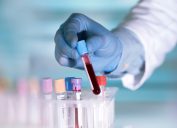Cardiologist Says These 2 Health Metrics Can Predict How Long You’ll Live
Knowing your VO2 max and muscle mass can provide insight into your potential lifespan.

For many, the idea of deliberately extending your lifespan can feel like a bit of a shot in the dark. Some focus on the habits and lifestyles of people who make it well past their 100th birthdays, while others simply try to maintain a healthy diet and exercise routine while hoping for the best. But what if there were a way to tell just how good of shape you’re in? According to a cardiologist, there are a couple of key health metrics that could help you predict how long you’ll live.
RELATED: Are You Fit Enough to Pass This “Old Man Test” That Measures Balance and Coordination?
One exercise measurement is a key longevity indicator.
Feeling great after an intense workout can be an immediate confidence booster. However, it also turns out that this can tell you a bit about your potential lifespan. In a recent TikTok video, cardiologist Jeremy London, MD, explains two clues that could shed light on your own situation, including something known as your VO2 max.
“That sounds really complicated, but it’s just an indicator of how efficient your body is in utilizing oxygen with intense exercise—so in other words, the health of your cardiovascular system,” he explains. “Not surprisingly, that increases health span and lifespan.”
Why is VO2 so important?
According to Harvard Health, the acronym stands for “volume,” “oxygen,” and “maximum,” which is typically measured in milliliters of oxygen consumed per kilogram of body weight per minute of exercise. Essentially, this measure shows how well your body can take the oxygen you breathe into your lungs and convert it into the adenosine triphosphate (ATP) needed to fuel your muscles and organs.
Normally, endurance athletes determine their VO2 in an exercise medicine lab using a heart monitor and special mask to gauge how much oxygen their body is absorbing while completing a short but intense workout. Otherwise, you can use a calculator that involves taking your pulse after a brisk walk, per Harvard Health. But either way, it’s not hard to see why it’s an important stat.
“Think about someone’s day-to-day effort,” Danny King, director of performance and recovery for dynamic personal training at Life Time health clubs, recently told GQ. “If I ask them to go walk up two sets of stairs and they’ve got a really low VO2 max, they may hit 85 to 90 percent of theirs because they have a relatively low total ability.”
RELATED: If You Can Lift This Many Pounds, You’re in Great Shape, Doctors Say.
Muscle mass can also shed light on your lifespan.
London says muscle mass is another important metric to consider.
“Now, there are multiple reasons why muscle mass impacts longevity,” he explains. “To touch on a few, the first is that muscle is a glucose sink, so it decreases your risk of insulin resistance and metabolic syndrome.”
“In addition, muscle—during times of illness—can secrete myokines, which are anti-inflammatory factors that can decrease the severity of these illnesses,” he adds.
It turns out bulking up isn’t just about looking buff. Increased muscle mass can improve your metabolism, promote maintained mobility, aid in bone health, and stave off cardiovascular disease and inflammation that can lead to cancer or other chronic diseases, according to The Ohio State University.
RELATED: A Daily Walk Could Add 11 Years to Your Life—If You Do It for This Long.
There are simple changes you can make to improve your outlook.
Hoping to make the most of this new knowledge? Fortunately, London says you can quickly improve your outlook with a few lifestyle modifications.
“The cool thing is, even if you’ve never exercised or you haven’t exercised for a long time, you can still get benefits,” he shares. “Start a consistent walking program [and] body weight resistance training. These things are free, accessible, and always available.”
King agrees, suggesting that adhering to the minimum of 120 minutes per week of cardiovascular exercise recommended by the Centers for Disease Control and Prevention (CDC) is a good approach. Still, this doesn’t mean you’ll need to plan on running a marathon anytime soon.
“A majority of your efforts should be lower intensity,” King told GQ. “Then, add in one or two harder, more intense efforts per week.”





















